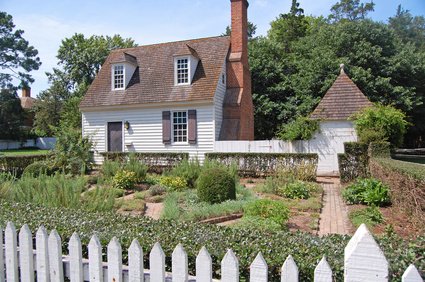 Mid-afternoon in the Apollo Room, Alexander Purdie stands before its brownish brick, marble-mantled fireplace and laments the loss of happier days. Mr. Purdie and the fireplace are flanked by two doors of the same teal-green as the rectangular room’s wainscoting and window frames; they stand out against the cream-colored upper walls. The golden slats of the wooden floor give slightly underfoot.
Mid-afternoon in the Apollo Room, Alexander Purdie stands before its brownish brick, marble-mantled fireplace and laments the loss of happier days. Mr. Purdie and the fireplace are flanked by two doors of the same teal-green as the rectangular room’s wainscoting and window frames; they stand out against the cream-colored upper walls. The golden slats of the wooden floor give slightly underfoot.
I love this room. Restored in the 1930s, the Raleigh Tavern at Colonial Williamsburg represents the heart of what pulls me three hours southward from my home in northern Virginia several times a year. Eleanor Roosevelt called it “the most delightful glimpse into past history”. If the late first lady was correct in her famous dictum that small minds discuss people, average minds discuss events, and great minds discuss ideas, then minds of all sizes and strengths should find plenty to intrigue them in Williamsburg. The adolescent ideas of ordered liberty-untried, often brash, inconsistent, and at war with one another-endured an awkward refining process as they were debated in 18th-century coffeehouses and taverns like this one. Here, the political history of my country’s birth, and the abrasiveness with which it touched real people’s hopes and heartaches, comes alive.
The site of elegant balls in colonial Williamsburg, the Raleigh Tavern’s Apollo Room would become one of the most important chambers in the story of American freedom during the years leading up to and during the Revolution. As tobacco smoke and impassioned rhetoric mingled in the air, many of the most significant moments in America’s break with Britain occurred within its green-and-cream walls.
On the evening of December 16, 1773, dozens of Sons of Liberty, disguised as Mohawks, rowed out to tea ships anchored in Boston Harbor, boarded them, split open the cargo chests, and dumped their contents – approximately 15,000lbs worth – into the water. They were protesting the British government’s taxing them without their consent. The British reacted to the Boston Tea Party in early 1774 with what became known as the Intolerable Acts, which included the closure of the Port of Boston and a quartering act that required families to lodge British soldiers in their homes. The Intolerable Acts were intended to make an example of Boston and intimidate the other colonies. In fact, they had the opposite effect: They unified the colonies.
In Virginia, George Washington argued that the colonies must not “suffer ourselves to be sacrificed by piece meals”. In Williamsburg, that colony’s capital, Thomas Jefferson, Patrick Henry, and other members of the House of Burgesses drafted a successful resolution declaring June 1, 1774, a day of fasting, humiliation, and prayer in support of the Bostonians. In response, Lord Dunmore, the royal governor, on May 26, 1774, dissolved the Virginia Assembly and kicked its Members out of the Capitol. The following day, the 89 members of the House of Burgesses met in the Apollo Room and passed resolutions against the importation of tea and other products.
The Revolutionary War began within a year. Early on, Mr. Purdie, who printed the Virginia Gazette, positioned himself and his newspaper with the cause of the Patriots. In the first half of 1776, the Gazette’s masthead featured a coat of arms with spear-wielding, armored men. But in July, when he was printing the Declaration of Independence, Mr. Purdie switched the coat to one similar to the Gadsden flag emblem, featuring a rattlesnake coiled above the slogan “Don’t Tread on Me”.
But as the War raged on and the years crawled by, Mr. Purdie came to miss the earlier and easier times even as he remained loyal to the cause of independence. And standing there in the Apollo Room, Mr. Purdie, portrayed by Colonial Williamsburg’s historical “interpreter” Dennis Watson, longed for the balls held in that Room during “more pleasant times”.
I wanted to shake him. Didn’t he realize that he was living in the most exciting period of history? A time when, as his fellow printer Ben Franklin observed, “We have it in our power to begin the world again.”
But I share much in common with Mr. Purdie, including a longing for the past. We both work with words, support the Revolution and its ideas and ideals, and come to the Raleigh Tavern for refreshment. And we both yearn for the past, although the time he wants to escape from is the time I want to escape to. Why else would I journey to Colonial Williamsburg several times a year? Crossing its footbridge to the 18th century, one steps over plaques marking the milestones toward the good old days:
1913
FROM THIS DATE
YOU PAY NO INCOME TAX AND RECEIVE NO SOCIAL SECURITY
Once in the “historic area”, lush green trees provide occasional shelter from the hot Virginia sun. Uneven bricks press through shoe soles; the opalescent shells (used to illuminate paths at night by reflecting moonlight) crackle underfoot. Tolling bells punctuate the clip-clop of horses. The meaty aroma of tavern fare and the smoky smell of burning wood mingle with that ever-present colonial scent of fresh horse manure. (“Don’t step in the authenticity,” tour guides warn.) It’s almost like turning back time.
Against this Brigadoon-esque backdrop, visitors meet the people of Virginia’s second capital city. Colonial Williamsburg’s most significant historical program is “Revolutionary City”, a series of skits re-enacting the major events surrounding the American colonies’ break with Great Britain and depicting their impact on the people of Virginia.
Living in momentous times didn’t insulate people from the momentary. Against the backdrop of dramatic political change, every-day concerns pressured the families of colonial Williamsburg. The Hoys were one such family. Alexander Hoy was a carpenter who fell into debt, at a time when people didn’t expect the taxpayers to bail them out. As foolish decisions made his situation more desperate, Mr. Hoy saw opportunity in the ary. But his wife Barbry, the unskilled mother of two daughters, worried about her husband’s safety and how she’d keep the family afloat if he enlisted. After her husband’s capture by the British, Mrs. Hoy was broke and forced to send their daughters to live with relatives as she begged for work. Whereas others debated the War for Independence on philosophical grounds, the Hoys argued the very present, practical plusses and minusses of his joining the fight, in the Revolutionary City skit “The Citizen Soldier!”
Other women faced different hardships. Slaves in the wealthy colony may have had enough to eat, but no personal freedom. After a reading of the Declaration of Independence, residents of colonial Williamsburg wondered what the new document meant for them, in the Revolutionary City skit “That Freedom Ain’t for Me”. One such resident was Lydia Broadnax, a literate slave in the home of George Wythe, whose name appears first among Virginians to sign the document. Colonial Williamsburg does a remarkable job of celebrating the ideas that founded America while acknowledging failures in living up to those ideas. Working in the home of one of Virginia’s leading patriots, Mrs. Broadnax heard the ideas of freedom and independence before they bore fruit in her own life. It is not certain when Mrs. Broadnax, who was born c. 1742, joined the Wythe household. Mr. Wythe granted her freedom in 1787, but she continued to work for him until his 1806 death by poisoning. As his cook, Mrs. Broadnax may have been able to identify Mr. Wythe’s ne’er-do-well grand-nephew and namesake George Wythe Sweeney as his murderer, but it was illegal for a black woman to testify against a white man, and Mr. Sweeney was never convicted. History records little of her later life.
Mrs. Broadnax died some time during 1820-27 and is buried on property she owned in Richmond. Freedom and independence weave their way slowly and awkwardly through real people’s lives.
Even well-off women lived in hardship, when compared with modern lifestyles. As General George Washington fought through the darkest hours of the War for American Independence, his wife was often by his side. A woman of great courage and character, Martha Washington followed her husband from army camp to camp, bringing with her as much food, cloth, and other provisions as her carriages could hold. At the camps, she organized other women into relief squads; they sewed urgently needed warm clothing as quickly as possible and comforted the wounded, including amputees, sufferring without morphine. Like many women of her class in the strictly stratified society of colonial America, Mrs. Washington felt a strong burden to care for those less fortunate. In addition to the practical aid she rendered her husband and his soldiers, her presence and many sacrifices greatly helped boost their morale.
These women lived during my dream place and time, where ideas wafted through the air like blossom petals on a breezy Spring day, when reason held passion by the hand, when American independence was being birthed, Athena-like, from the collective head of great minds.
But my 21st-century life is embarrassingly cushier than any of theirs. Would I really go back, if I could?
Well, may as well dream big: Sure, I’d go back as Thomas Jefferson. The chance to be one of the leading intellectuals shaping ideas into a confederation of free and independent states, debating friends and foes in a climate that prized rhetoric based on reason, daily living out the sheer joy of the intellectual challenge of the age, would be worth doing without air conditioning, modern medicine, and indoor plumbing.
But what if my time machine could only transport me as what I am: an unmarried white woman over 30? What would my life be like then? I could live with my parents. Or I could work at one of the trades open to women, like printing or tavern management, surrounded by the ideas I love, but only on the edges. I couldn’t vote, but despite noble protestations of “taxation without representation”, I’d still have to pay taxes. And even if I received permission to worship in the austere Presbyterian meeting house, I’d have to pay my tithe to the Church of England, the established religion of Virginia, not the colony of choice for those seeking religious freedom.
On the other hand, I’d be going back to a time when the urgent cacophony of cell phones, e-mail, and an ever-expanding plethora of social networking sites wasn’t there to drown out the soft whisper of ideas. When people didn’t expect to live lives of borrowed cushiness, protected by a representative government established by the sacrifice of those who never knew a tenth of modern comfort and convenience.
So, would I go back? Well, maybe.
But that’s not going to happen, and that’s okay. To honor the past doesn’t mean to dwell in dreams of magically going back to it. It means to keep its spirit alive by adapting it to the present. That’s why I’m grateful to travel to Colonial Williamsburg in the twenty-first century, when I’m more free to absorb ideas in the Apollo Room than I’d have been in the eighteenth.







Leave a Reply